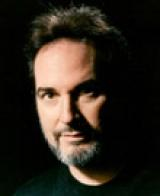| home |
| biography |
| repertoire |
| critical acclaim |
| gallery |
| discography |
| videos |
| RM Opera Studio |
| links |
| contact |
|
Critical Acclaim “The U.K. “Artist of the Year” has been chosen – Robert McFarland – who…brought to the stage the most unique, dramatically demanding, but magnificently sung Scarpia in Opera North’s Production of Tosca ever observed.” “Robert McFarland’s rendition of the Jester Rigoletto far surpassed any expectations with his dramatic and vocally effortless performance Friday evening. As we heard Mr. McFarland give the Cleveland audiences a thrill with his Dutchman, no one could have imagined him lending that dramatic voice to Verdi’s score with such fullness yet ease of singing. His performance never let up until the last bars of the piece not missing an opportunity to give the listener the ultimate performance.” “The evening really began to experience drama when the audience heard the voice of Jochanann - Robert McFarland. Mr. McFarland was obviously enjoying vocal freedom as he displayed this heavy, difficult role without any evidence of labor or strain. Clearly, the Austin Lyric audience enjoyed an International level of performing on this opening night.” “Baritone Robert McFarland … brought the house down with several minutes of bravo… In the best tradition of superb American Baritones.” “Robert McFarland made his debut in the title role of The Dutchman… He brings the Cleveland audience a huge spectrum of vocal power, style, finesse and control. His monologue was spectacular to watch as well! To close the eyes – one could have thought George London had stepped onto the stage once again. The Cleveland audience will not soon forget this musical evening.” “The Alcoholic father “Frank Maurant” performed by Robert McFarland clearly demonstrated the abusive husband. McFarland had this character easily in his grasp yet his voice was clearly under control showing great pain and a passionate quality easily touching the heart. Even after he murders the milkman, he still brings sympathy, as it is clear he cannot help himself for his downward dilemma. Robert McFarland provides a great performance in Kurt Weil’s debut for the Des Vestin Theater.” “with Plàcido Domingo's Otello was the remarkable acting and seamless singing of this American Iago - Robert McFarland… [He] owned the night with a performance not to be forgotten. The Teatro … felt the sparks fly between these two giant figures of literature.” “Plàcido Domingo was brilliantly partnered by Robert McFarland as Iago, a true baritone with a dark, flexible, finely-wrought, well-modulated voice. This dramatic baritone more than held his own – never in the shadow of Otello. No need for this Iago to leer and snarl: using his mobile features and supple body, he looked like a sleek panther tormenting a wounded lion. He also made good chemistry with Domingo: sparks were flying about during their encounters: but the night belonged to Robert McFarland.” “Robert McFarland (Ford) possesses a magnificent heroic baritone using it unsparingly yet brilliantly on his first night. The American Baritone enjoyed a very strong British debut as the jealous husband of Alice Ford. Obvious was the making of music between maestro Haitink and McFarland as Glyndebourne enjoyed some of the finest stylistic yet powerful musical performing since this reviewer can remember.”
|
|
|
||
